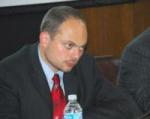Vladimir Kara-Murza
World Affairs
If anyone had told members of Russia’s lower house of parliament on August 16, 1999 that the vote they were about to take would shape events in their country and much of the world for the next two decades, they would have been very surprised. A week earlier, President Yeltsin had dismissed Prime Minister Sergei Stepashin and nominated Russia’s domestic security chief to take his place; the extraordinary session of the Duma was called in the midst of the August recess to consider the nomination. The candidate’s name was Vladimir Putin, and he was little-known even to many in the establishment, let alone the public at large. Yeltsin’s announcement that he would like to see the premier-designate succeed him in the Kremlin was met with ridicule.
That incredulous possibility was not even mentioned by most lawmakers as they spoke in the chamber that afternoon. The only exception was Grigory Yavlinsky, leader of the liberal Yabloko group, who remarked that “we do not consider it appropriate that people who had worked in the Soviet security services can lead our country and run in presidential elections.” There was nothing like the drama of the German Reichstag session in the Kroll Opera House on March 23, 1933; the speeches were routine and uneventful. In fact, parliamentary leaders hardly even discussed the candidate or his program, preferring to spar over their own political differences. Russia was four months away from a parliamentary election; the pollswere predicting a strong showing by opposition parties; and the appointment of what was likely to be yet another caretaker prime minister—Russia’s sixth in seventeen months—did not seem like an important matter.
Perhaps some in the chamber should have paid attention to Putin’s pledge to “strengthen the executive vertical of power” or his stated preference for the abolition of direct elections for regional governors, but no one did. “I don’t think we should torment ourselves with this decision,” Oleg Morozov, leader of the centrist Regions of Russia group, counseled his colleagues. “We should vote, forget about it, and get on with business. We all have things to do.” The vote was done with at 5:22pm, when Speaker Gennady Seleznev announced the results: 233 of the 450 members of the Duma voted to confirm Putin as prime minister; 84 voted against.
Nineteen days later, an explosion in the southern town of Buinaksk would set off the chain of mysterious apartment bombings that killed more than three hundred people across Russia and gave Putin’s government a pretext for a full-scale military campaign in Chechnya. It was against the backdrop of this national emergency that the uncharismatic KGB officer—styling himself as Russia’s savior with the promise to “wipe out terrorists in the shithouse”—went from two percent in the polls to securing a parliamentary majority in December’s election. By New Year’s Eve, with Yeltsin’s surprise resignation, he was in the Kremlin; the following May many of the same lawmakers who had rushed through the confirmation vote to "get on with business” were guests at his presidential inauguration.
The rest, as the British say, is history.
Article URL:
http://goo.gl/xm3iXB
